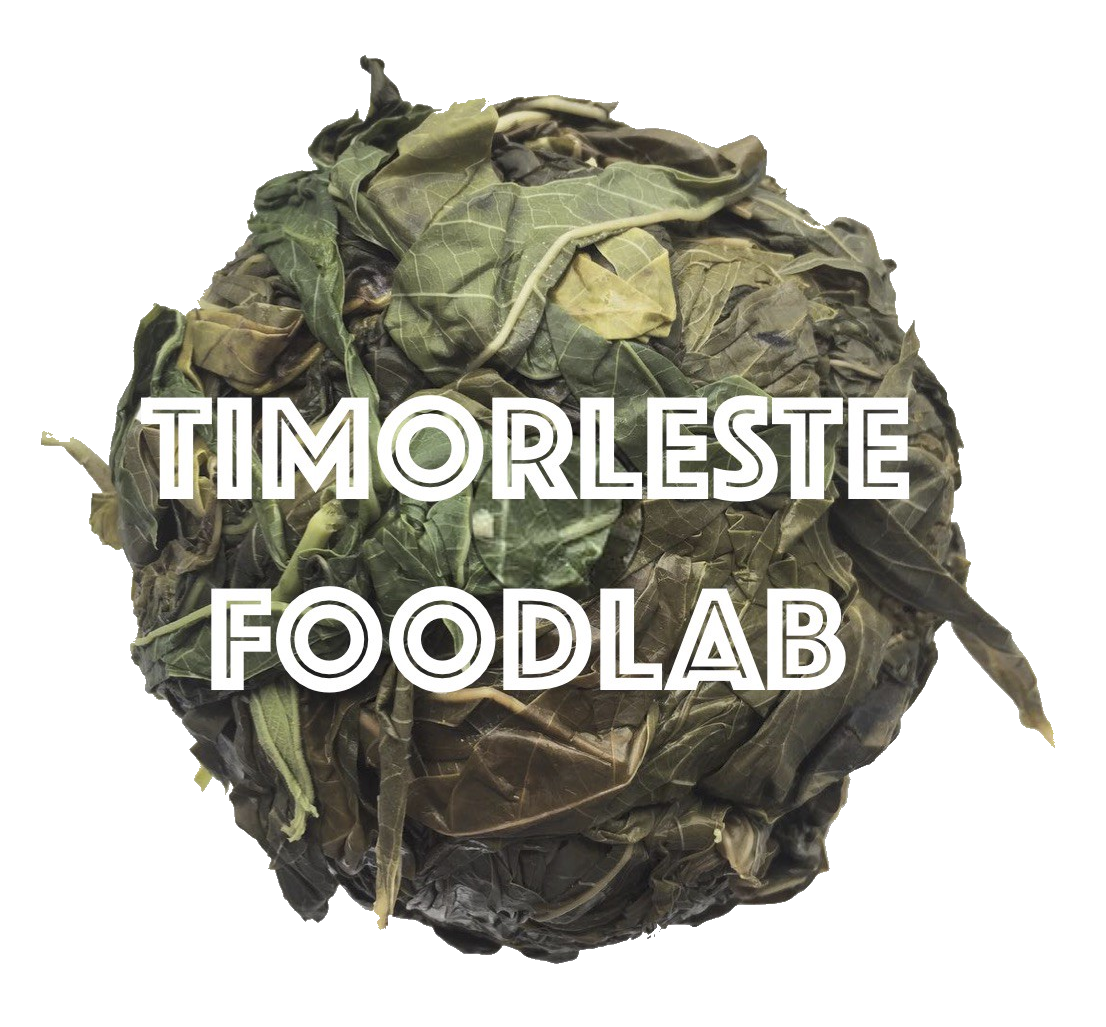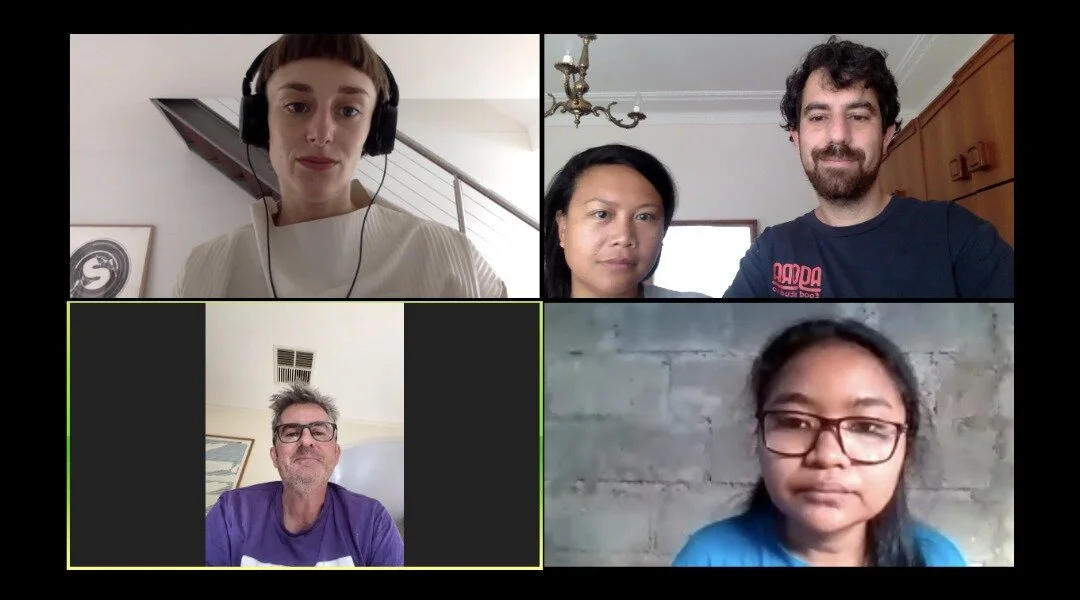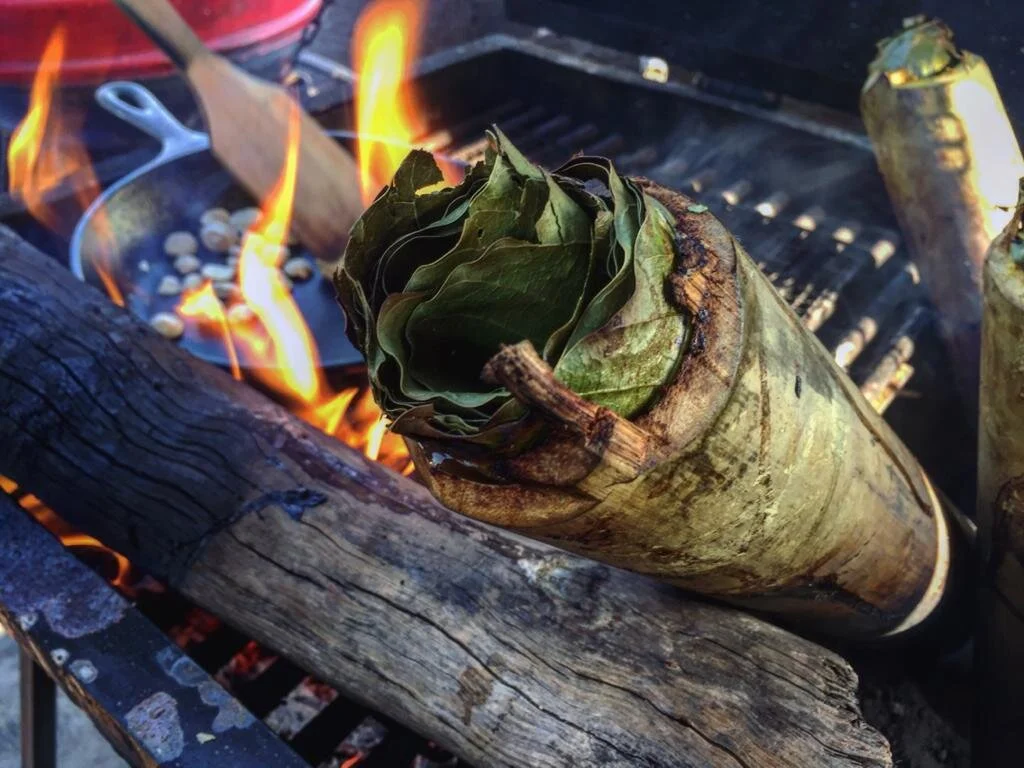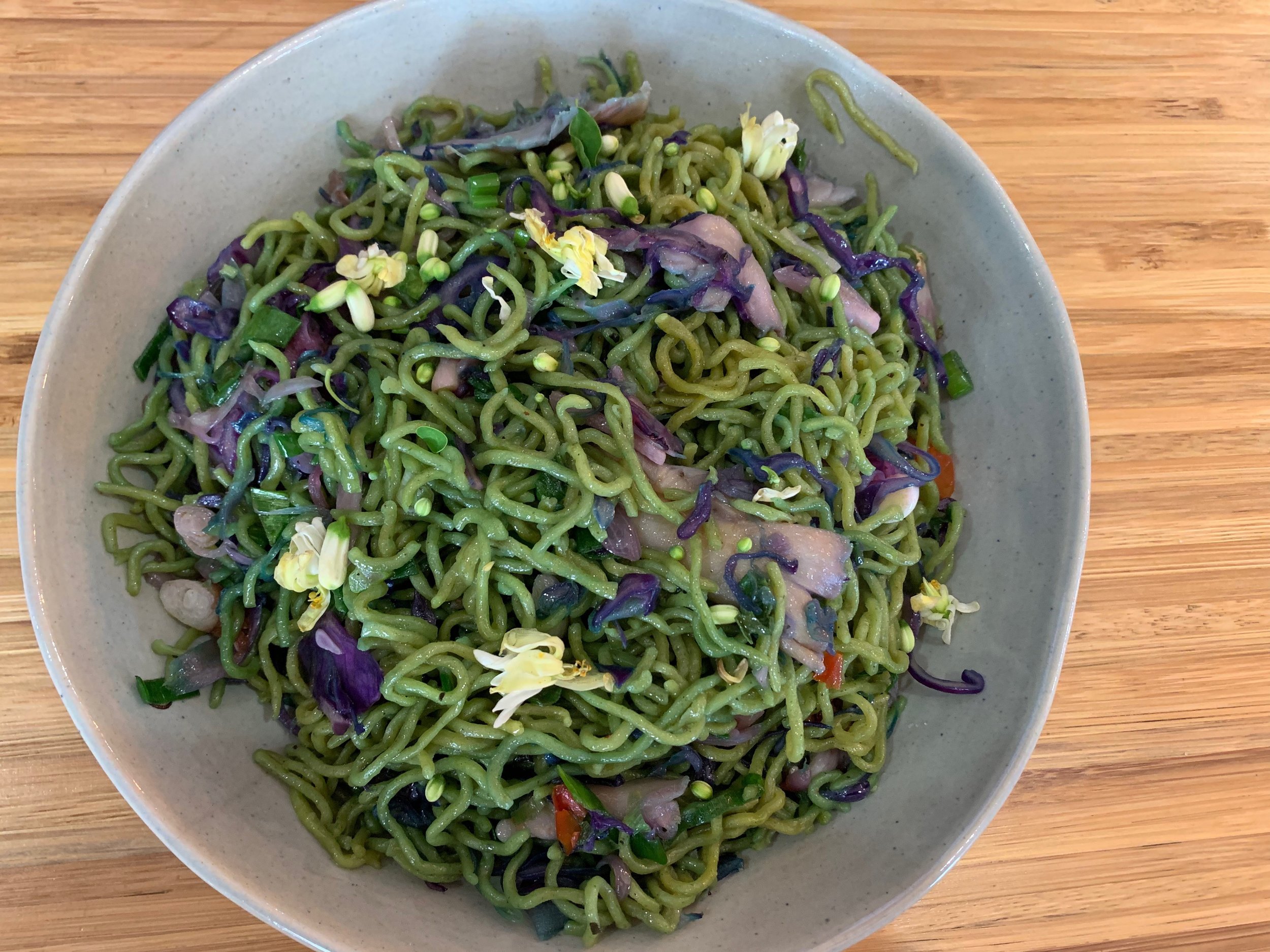The pluralistic nature of food culture and food systems produces complex and blended realities for research, often prompting approaches that embrace mixed methods and cross-sector partnerships. In parallel, calls for the decolonization of research methods have brought attention to the importance of relationality when working with local communities and traditional knowledge holders. This article presents the process and outcomes of the Timor-Leste Food Innovators Exchange (TLFIX), a multifaceted initiative centered on the contemporary and historic foodways of Timor-Leste, including current challenges to individual health, cultural identity, and economic-ecological sustainability brought about by centuries of colonial and transnational influence. Conceived within an international development context, TLFIX aimed at building local empowerment, economic development, and social change. Methods included quantitative, qualitative, and material-based approaches, including surveys, storytelling, and culinary innovation. As a “consulting academic” on the project, I contributed to the research design, coached team members on storytelling-as-method, and participated in a portion of the work. For the current text, I use the notions of recombinance, responsiveness, and relationality to interpret our collective experience and to frame an example of carrying out mixed-method and mixed-participant work in complex food contexts. As a whole, this example illustrates ways in which to leave space for improvisation and emergence within food practice and scholarship.
Read MoreThe U.S. Agency for International Development (USAID), through USAID’s Tourism For All Project, is celebrating World Tourism Day 2021 with the second annual Turizmu Ba Ema Hotu Tourism Champions awards, a program to recognize organizations and individuals who have made an outstanding contribution to the tourism industry in Timor-Leste. The project has also continued its Tourism Youth Ambassadors activity for a third year, with a public speaking competition for young men and women on this year’s World Tourism Day theme, “Tourism For Inclusive Growth.” USAID and partners recognized the winners at a ceremony on October 8 at the U.S. Ambassador’s Residence in Dili.
[…]
Agora Food Studio: During the COVID-19 crisis, many small Timorese-owned businesses were dependent on social media marketing to offer takeaway and delivery services. With support from USAID, Agora Food Studio produced a series of instructional videos to improve e-marketing skills and to help restaurants apply health protocols when they reopened.
Read MorePaulina Mau Torres Da Cruz (known as Paula) first started working at Agora Food Studio in Dili in 2017. Now, she is a Program Manager and an experienced tourism Business Coach. She is a rising star of the tourism industry and is helping others to find their way to success in the sector. From Uatu-lari in Viqueque, Paula coaches her team in self-confidence (listen to her podcast here!), she manages customer engagement and is the coach for Agora’s Administration team, and also facilitates digital marketing workshops for Timor-Leste #nextgen tourism entrepreneurs. Since 2020, she has been leading Timor-Leste’s healthy local noodles revolution, finding a new market for Timorese produce under the TimorMie brand. She is passionate about food: “Good food is about love. Good food is eating our local products that have high nutrition and makes us healthy, it is eating together with family to share our parents and grandparents’ stories. Eating good food is very important, like sharing our love to each other. So starting from now, let’s practice cooking good food for ourselves and our family to eat, like we are giving our love to them.”
Read MoreIf an assessment team was to use standard evaluation criteria to assess my performance in preparing the first episode in our podcast series, Memorandum of Understanding, they’d say it’s too early to tell in terms of ‘impact’ and ‘relevance’ but find me wanting in terms of ‘efficiency’. Producer Julia was aghast when I delivered five hours of audio for a thirty-minute podcast. I have promised to dial back the garrulous Irish pantomath routine going forward.
Our inaugural episode centres on Agora Food Studio, a social enterprise in Timor-Leste set up by Alva K. Lim and Mark Peter Notaras, two aid workers who felt spiritually undernourished from years writing reports and rigging up banners hailing new programs. Five years ago, they set up their restaurant in Dili with a focus on celebrating East Timorese coffee and food – cassava, corn, wild yams, wild leaves, beans, nuts, seeds, honey, juices squeezed from seasonal fruits like monkey tail and rose apple, kombucha fermented in rosella and turmeric. They have developed more than sixty East Timorese chefs and restauranteurs since opening in 2016 and run a wide range of mentoring projects.
Read MoreAid is a darned sight livelier than that that is described in the bloodless language of official records and reports. So what do chlorinated phrases in development like capacity building look like when done right? We begin in Dili, Timor Leste, at Agora Food Studio, a restaurant set up by two slightly world-weary aid workers who found that they could achieve more in setting up a place that celebrates East Timorese food and developing East Timorese chefs and restauranteurs than through all those reports that they'd previously been slaving over.
We hear from Alva Lim and Mark Notaras, the two architects of Agora, as well as the restaurant’s project manager Paula Torres. Paula’s parents, Petrolina Torres and Paulo Soares da Cruz can be heard speaking in Tetun throughout the podcast. We also talk to the author of a work-in-progress Tetun-English idiom dictionary, Anacleto Ribeiro, to learn why food is the perfect entrée into understanding Timor Leste, and an ideal model for thinking about development.
Read MoreIn light of the global coronavirus pandemic and border closures, Timor-Leste is unexpectedly experiencing a bump in people sharing and searching for fresh local destinations under the Ha’u-Nia Timor-Leste domestic tourism promotion campaign. As people are becoming frustrated and bored, they’re looking through social media to see places that can reignite the spirit of travel, and for some – ignite it.
Through a question and answer format, Agora Food Studio takes a look at how the next generation of young tourism champions are unlocking each other’s potential. Agora Food Studio who has been working with a range of partners throughout 2020 using two interesting pedagogical practices: peer-to-peer coaching, and building connections and relationships through a “community of practice”.
Read MoreDuring the COVID19 lockdown, Timor-Leste Food Lab took the opportunity to skill-up by doing courses on business coaching. Torrey Peace, Founder of AidForAidworkers.com, interviews Paulina da Torres on the impact of coaching, and how coaching techniques from Torrey’s course has been used in Agora Food Studio with surprising positive effects.
Read MorePublished on Channel News Asia’s website,click here to read it.
“At social enterprise, Agora Food Studio, food experimentation driven by innovation is attempting to empower young Timorese like da Cunha to look back, collaborate and harness the power of what nature has provided for this land. The team comprises young cooks from around the country - diversity by design. “We work here, but we go to the mountains and we experiment. And we understand that our food has value,” said da Cunha.
Read MoreThe original article can be seen here.
Timor-Leste Food Lab
Building upon their establishment of Slow Food Dili—the capital of Timor-Leste, also known as East Timor—in 2015, Alva Lim and Mark Notaras co-founded the Timor- Leste Food Lab in 2016. The Food Lab is a social enterprise funded entirely by a plant-forward partner restaurant and cafe, Agora Food Studio. Both aspire to shape a truly sustainable food system in Timor-Leste based on the production and consumption of nutritious, local foods. The restaurant focuses on using seasonal, plant-based ingredients, maintaining minimal waste, and reviving indigenous knowledge. They source 90% of their ingredients from smallscale farmers and local markets.
Read MoreFOUNDED by Australian Rotary Peace Fellow Mark Notaras and wife Alva Lim, the Timor-Leste Food Lab is shaping the future of food and agriculture in the Asia-Pacific by embracing the region’s profound food diversity and bio-cultural history.
The Dili-based social enterprise has trained and mentored teams of young Timorese hospitality and tourism champions, who are innovating with their own heritage foods and unique coffees.
Read MoreTraditional foods of the Pacific are vanishing, leading to disastrous but preventable public health consequences for indigenous populations. The region suffers from the highest rates of obesity in the world, while paradoxically also facing a double burden of chronic malnutrition.
Two inventive new food programs in the Pacific are fighting the public health crisis by addressing both informational and sociocultural barriers. Despite a similar holistic approach, each takes a different path to achieve results.
Read MorePeople all around the world love to eat instant noodles, and Timor-Leste is no exception. Wherever you travel in this beautiful mountainous country you can invariably find a small kiosk selling cups of instant noodles to weary travellers. Instant noodles might make a cheap and convenient snack, but their nutritional benefits are very questionable. Instant noodles are usually high in carbohydrates, fat and salt, but low in protein, fibre, vitamins and minerals.
TLFIX is an interactive platform for Timorese food innovators to increase their use and promotion of nutritious, local Timorese ingredients and cuisine. Thanks to the flexible support of the DFAT's Innovation Exchange model which enabled Timorese food innovators to focus on certain foods that communities are used to and demanding, TLFIX is attempting to disrupt these unhealthy noodle trends. Demand-driven experimentation has led to the creation of delicious and nutritious instant noodles which use local ingredients and do not contain any artificial ingredients.
Read MoreThe Agora Food Studio (AFS) is the first ‘food-hub’ in Timor-Leste. It works primarily to promote Timorese food culture internationally, while providing employment and addressing development issues such as malnutrition. The UNDP has collaborated with UNICEF, the Government of Timor-Leste, Qatar Fund for Development and German Development Corporation to support AFS as a part of our ‘accelerator lab’ initiative. The Accelerator Labs are UNDP’s new way of working in development. The labs work together with national and global partners to find radically new approaches that fit the complexity of current development challenges. The labs will introduce new services, backed by evidence and practice, and accelerate the testing and dissemination of solutions within and across countries. In Timor-Leste’s context the accelerator lab is focused on job creation to maximise the potential of the ‘youth boom’ Timor will face in coming years.
Read MoreUntouched coral reefs, pristine beaches, organic fresh-fruit markets, and gentle, friendly locals make Timor-Leste’s seaside capital, Dili, a sleepy tropical paradise.
Twenty years after securing its independence from neighboring Indonesia, Timor-Leste today is a peaceful and prosperous new nation, with abundant natural beauty and emerging food, creative art, and nightlife scenes. With the culture and history of its hard-fought independence, the resilient country’s beating heart, and an easy-going energy led by its artists, musicians and sleepy street-hawkers, Dili makes for a unique, stimulating option for a weekend away in the region.
Read MoreAlva Lim moved from Australia to Timor-Leste, where she co-founded the Agora Food Studio, a social enterprise that celebrates the unique Timorese cuisine.
Read MoreThe World Food Programme’s intern Juleysia Sarmento shares why she has fallen in love with Timorese food
Read MoreThe Australian owners of a restaurant in East Timor are hoping to use their passion for the local cuisine to combat malnutrition in the tiny Southeast Asian nation.
East Timor has Asia's worst rates of child malnutrition, with more than 50 percent of children suffering from stunting - a condition that permanently affects their mental and physical development - according to the United Nations.
But this is not primarily due to a shortage of food - instead, the U.N. children's agency UNICEF blames a lack of education and knowledge about local foods.
Read MoreWhen Canadian food researcher and consultant David Szanto went to Dili in August 2018, he visited LAUNCH Food Innovator TL-FIX and took a deep dive into Timorese culture and cuisine. Here, David describes the people, the stories, and the transforming foodscapes he witnessed.
Does your organizational recruitment focus on the qualities that lead to high performing staff, such as motivation and how they work in a team environment?
Read More


















